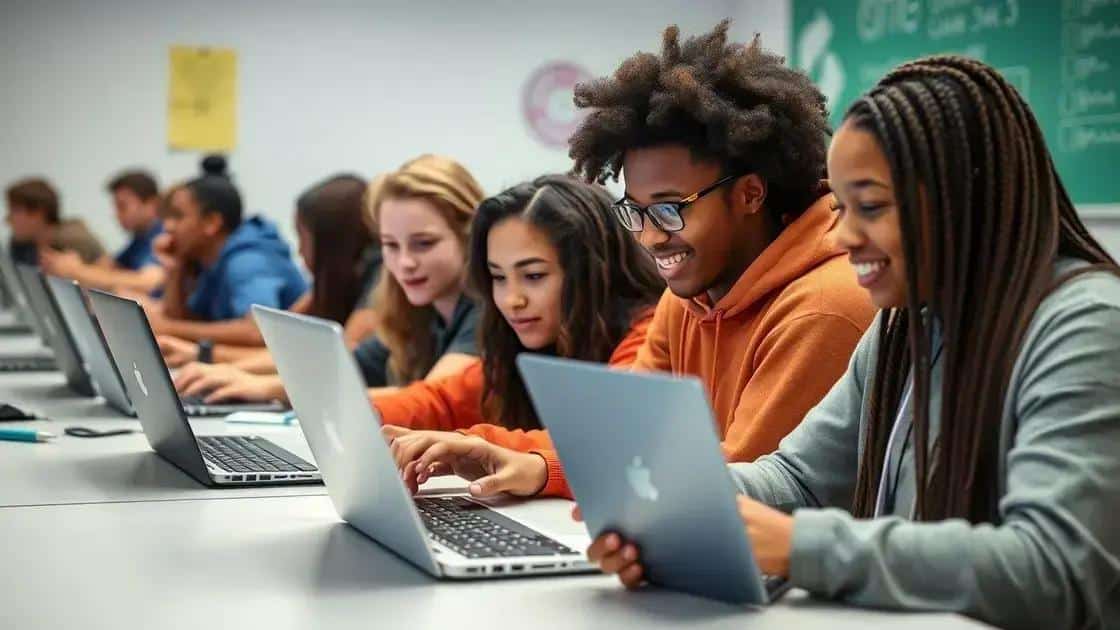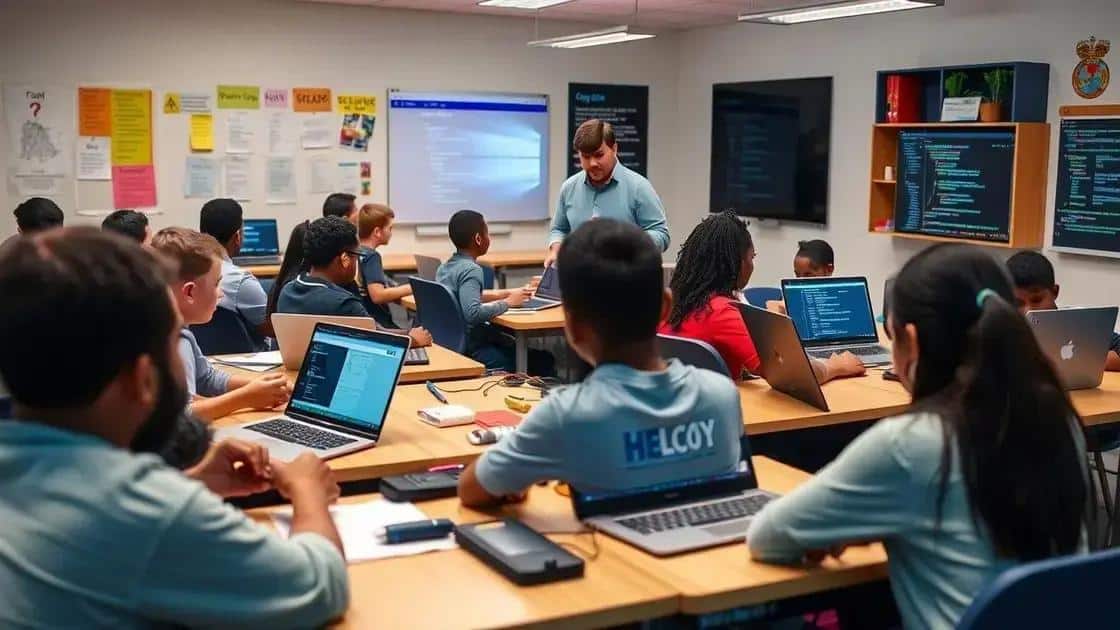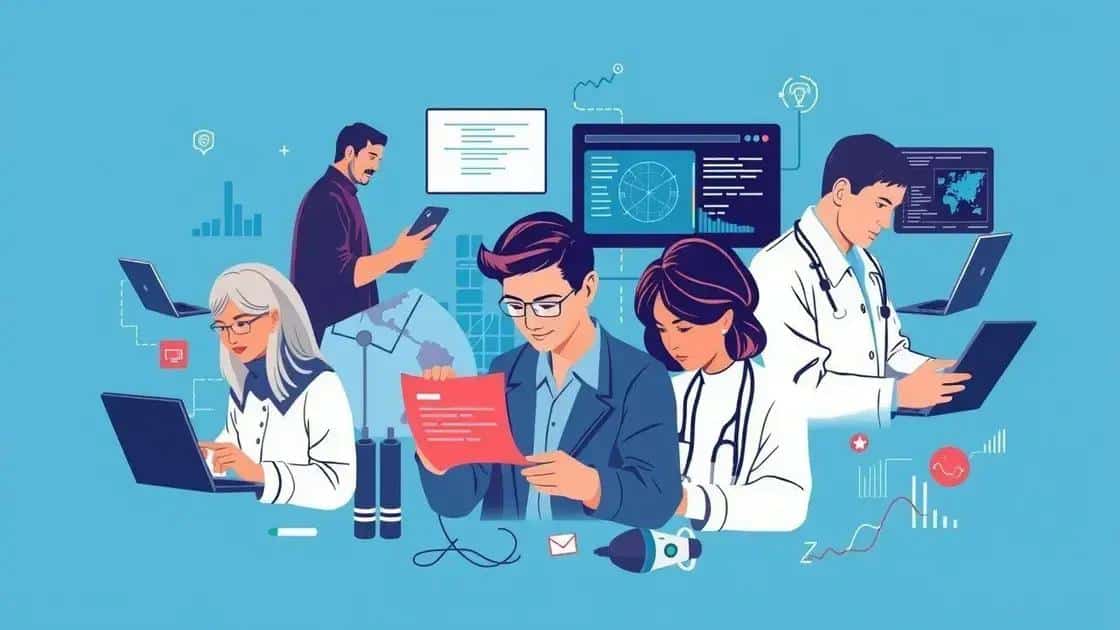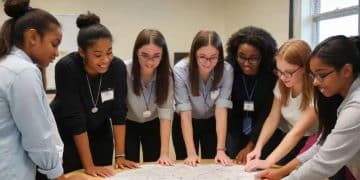Insights on high school coding classes you can’t miss

Insights on high school coding classes reveal that they equip students with essential skills like critical thinking, creativity, and problem-solving, which are applicable in technology and various other industries.
Insights on high school coding classes show just how pivotal these programs can be for students’ futures. Have you ever considered how learning to code might shape career paths? Let’s dive into it.
The importance of coding in today’s world
In today’s world, understanding coding has become essential. It’s not just for those pursuing a career in technology; it’s a valuable skill across various fields. Let’s explore why learning to code is important in modern education.
Why Coding Matters
First, coding helps develop critical thinking. Students learn to break problems into smaller, manageable parts, making the solution process easier. This skill is beneficial in both academic and personal situations.
Moreover, coding fosters creativity. When students create their own programs or games, they are not just following instructions; they are constructing something unique. This creative process can boost their confidence and engagement in learning.
Key Benefits of Learning Coding
- Opens up career opportunities in technology and other sectors.
- Enhances problem-solving skills that are valuable in everyday life.
- Teaches persistence, as coding involves debugging and improving code.
The world is becoming increasingly digital. Knowing how to code is like learning a new language; it allows individuals to communicate with technology and leverage it for various tasks. More and more industries are integrating technology into their operations, making coding a beneficial skill to learn.
Furthermore, access to online resources makes it easier for students to get started with coding at any age. Platforms like Scratch and Code.org provide engaging tools that make the learning process fun and accessible. With guidance, even younger students can grasp the fundamentals and start creating their projects.
In summary, coding is more than just a tech skill; it prepares students for a future where technology is integral to almost every profession. By equipping themselves with coding skills, students enhance their learning experiences and build a foundation for future success.
How high school coding classes are structured

High school coding classes are designed to engage students in a hands-on learning experience. The structure of these classes often varies, but they typically focus on several core components to ensure students gain a solid foundation in coding.
Class Organization
Most coding classes are structured around both theoretical knowledge and practical application. Students usually start with learning the basics of programming languages such as Python, Java, or HTML. These classes often incorporate projects that allow students to apply what they have learned in a real-world context.
Teachers guide students through both individual assignments and collaborative projects. Collaboration is key as it teaches students how to work together, solve problems, and share ideas. These skills are essential in the tech industry where teamwork is often necessary for success.
Curriculum Components
- Introduction to programming languages.
- Basic computer science concepts like algorithms and data structures.
- Hands-on projects including app development and game design.
Additionally, many coding classes include assessments that gauge student understanding. These can range from quizzes to coding challenges, which are designed to reinforce the concepts taught in class. This systematic approach helps keep students engaged while ensuring that they grasp important programming skills.
Extracurricular activities are also common in high school coding programs. Students might participate in coding clubs, hackathons, and competitions, which provide further opportunities for learning and growth. These experiences foster a sense of community and excitement around coding, making it more than just a classroom subject.
Ultimately, high school coding classes aim to create an environment where students can discover their passion for technology. By combining structured curriculum with practical experiences, these classes prepare students for future careers in a digital world.
Skills students gain from coding education
Students who participate in coding education acquire a variety of essential skills that are valuable in today’s technology-driven world. Learning to code goes beyond mastering programming languages; it also enhances critical thinking, creativity, and more.
Critical Thinking
One of the main skills gained is critical thinking. When faced with coding problems, students learn to analyze issues, identify solutions, and evaluate the outcomes. This systematic approach can lead to better decision-making not just in coding, but in everyday situations.
Additionally, coding encourages students to view problems from multiple angles. They often need to debug their code, which reinforces the importance of patience and persistence. This skill is crucial in both academic settings and real-life challenges.
Creativity and Innovation
- Coding allows for creative expression through game design and application development.
- Students learn to turn their ideas into functional products.
- They develop a sense of ownership and pride in their creations.
This creative aspect of coding is particularly engaging for students. They get to create websites, apps, or games, which fosters a sense of accomplishment. Seeing a project come to life can boost motivation and encourage further exploration in technology.
Moreover, students also gain skills in collaboration. Many coding projects require working in teams, which teaches them how to communicate, share ideas, and support each other. These teamwork skills are vital as they prepare for future careers, where collaboration is often essential.
Another important skill developed through coding education is adaptability. Technology is constantly changing, and coding lessons often involve learning new tools and languages. Students become accustomed to facing new challenges and adjusting their approaches, making them more resilient.
Overall, the skills gained from coding education empower students to thrive in various aspects of life and careers, equipping them with tools that will be useful throughout their futures.
Real-world applications of coding skills

Coding skills have numerous real-world applications that extend beyond the classroom. Understanding how to code opens doors to various opportunities in many industries. Let’s explore some of the key areas where coding is essential.
Technology and Software Development
The most obvious application of coding is in technology and software development. Programmers create applications, software, and websites that people use every day. Learning to code equips students with the skills to develop new technology, from mobile apps to sophisticated web platforms.
These creations can range from simple programs to complex systems. For example, students who learn coding can design games, build e-commerce sites, or develop tools that improve efficiency in business operations. This is just one of the many exciting paths available in the tech industry.
Data Analysis
- Coding helps in managing and analyzing large data sets.
- Businesses use coded programs to derive insights from data.
- Coding is crucial for automation of data processes.
Another significant field where coding skills are applied is data analysis. Companies collect massive amounts of data each day. Coders create programs that help to analyze and visualize this data, making it easier for businesses to make informed decisions. For example, being able to convert raw data into user-friendly graphs can dramatically improve business strategies.
Furthermore, automation of tasks is an essential aspect of data management. Coders can create scripts to automate repetitive processes, allowing companies to save time and resources. As a result, coding is critical for improving productivity in various sectors.
Healthcare and Medicine
Coding is also making an impact in the healthcare sector. Medical professionals rely on coded systems for managing patient data, scheduling, and billing. Moreover, advancements in medical technology, such as telehealth services and health apps, require programmers to develop and maintain these applications.
These systems are crucial for enhancing patient care and improving access to medical services. Coding enables healthcare providers to streamline their processes and deliver better outcomes for patients.
In summary, the applications of coding skills are diverse and impactful across different fields. By learning to code, students can prepare for careers that embrace technology, enhance their problem-solving skills, and contribute meaningfully to society.
FAQ – Frequently Asked Questions about High School Coding Classes
Why is coding education important for high school students?
Coding education is essential because it develops critical skills such as problem-solving, creativity, and collaboration, which are valuable in many careers.
What skills do students gain from learning to code?
Students learn critical thinking, creativity, teamwork, and adaptability, which prepare them for future challenges in a digital world.
How do real-world applications of coding impact job opportunities?
Real-world coding applications in various fields, like technology and healthcare, increase job opportunities for students who are proficient in coding.
What kinds of projects can students create in coding classes?
Students can design games, build apps, and develop websites, allowing them to express their creativity and apply their coding skills in practical ways.






